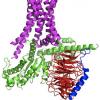I was looking into getting some antiinflammatory that isn't aspirin or ibuprofen. What would you guys recommened? I looked into Isoprinosine since it was praised in the Durk Pearson and Sandy Shaw book Life Extension. I know little about it. Some people like it some don't. I read it's great for herpes as well. Some online pharmacy had Isoprinosine listed as an anti inflammatory. There's a thread about Isoprinosine on this forum. I think Isoprinosine is similar to Inosine but some people imply they are one in the same. Although Isoprinosine is prescription only and NOT available in the U.S.
Does a "real" anti inflammatory drug need to be a steroid?
Scientists Discover 'Trick' Steroids That Can Suppress Inflammation
"A new “trick” steroids use to suppress inflammation, which could be used to make new anti-inflammatory drugs without the harmful side effects of steroids, has been discovered by researchers at Georgia State University."
"Glucocorticoids, a class of steroid hormones, are among the most commonly used anti-inflammatory agents. "
"There is an urgent need to develop novel anti-inflammatory strategies to combat inflammation, which is the cause of many human diseases. Inflammation has been linked to cancer, pulmonary diseases, infectious diseases, neurological diseases, arthritis, otitis media (ear infections) and obesity."
“Chronic inflammatory diseases last for months and years, so you have to have a medicine that can be used for treating inflammation for the long term without having side effects."
“We have found steroids also suppress inflammation by upregulating IRAK-M, a key negative regulator of inflammatory pathways."
Which glucocorticoids have less side effects? Are the androgenic anabolic steroids considered anti inflammatory then as well? Would the eye drop anti inflammatory work as well as the orals tablets? I see dexamethasone (a glucocorticoid) sold online as eye drops. What is up with that? Even Visine eye drops with tetryzoline is sold as an anti inflammatory.
"Glucocorticoids have also been shown to have a significant impact on vigilance (attention deficit disorder) and cognition (memory).
Long-term exposure to glucocorticoid medications, such as asthma and anti-inflammatory medication, has been shown to create deficits in memory and attention both during and, to a lesser extent, after treatment,[11][12] a condition known as "steroid dementia."[13]" Wiki on glucocorticoid
Edited by eon, 19 January 2015 - 03:59 PM.























































